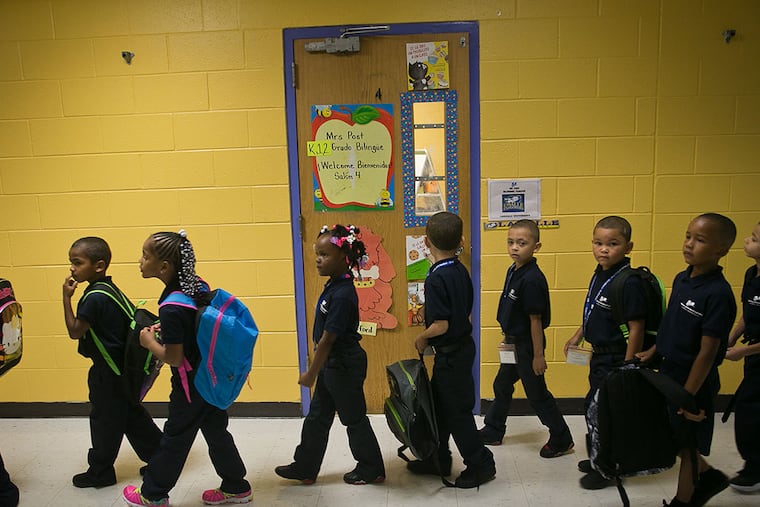First day at one of Camden's newest hybrid schools
Dressed in navy blue polo shirts and dragging backpacks behind them, the first graders in Christina Gonzalez's class filed into their classroom quietly for their first day at North Camden's Molina Elementary School.

Dressed in navy blue polo shirts and dragging backpacks behind them, the first graders in Christina Gonzalez's class filed into their classroom quietly for their first day at North Camden's Molina Elementary School.
There were a few nervous tears, there was some talking, and because of registration glitches, a few students did not yet have name tags on their coat hooks. Otherwise, it looked like any other day.
"I am so excited to show you our classroom," Gonzalez said, herding the students gently into the room, decorated with cutout paper bees and colorful posters.
Wednesday marked the opening of Molina, along with two of Camden's other new Mastery schools - McGraw Elementary and East Camden Middle School.
The three were taken over by the private, nonprofit charter-school company earlier this year when Paymon Rouhanifard, superintendent of the state-run district, elected to convert five city schools to charter-public hybrid "Renaissance" schools.
Also this year, Henry L. Bonsall Elementary will be operated by Uncommon Schools, and students who attended J.G. Whittier Elementary will have classes in the new KIPP Cooper Norcross Academy in Lanning Square.
The schools have new curriculum, new rules, and many new educators.
Rouhanifard, appointed by Gov. Christie in 2013 to lead the district, has said the changes will give Camden's parents more school choices and better facilities. Just one in five district students can read, write, and do math at grade level, officials have said, and many attend class in crumbling buildings.
Unlike charter schools, Renaissance schools guarantee seats to children in their neighborhoods. They also have contracts with the district mandating that they provide services for students such as special education and mental health support.
They also must operate in new or significantly renovated buildings.
Rouhanifard has drawn criticism from teachers and some Camden activists, who say his support of Renaissance schools is part of a plan to push out teachers and weaken the city's traditional public schools. Converting the five schools to Renaissance models this year meant changes in the schools' leadership, and the Mastery schools alone hired 71 new teachers.
Educators who worked in the targeted schools had to interview for positions with the school's new Renaissance operator, and if they were not hired, they were reassigned elsewhere in the district.
The New Jersey Education Association has sought to stop the conversions, arguing that they violate state laws and were implemented without adequate community input.
"Our Camden schools face a lot of challenges due to poverty, unemployment, crime, and a lack of support services for struggling families," NJEA president Wendell Steinhauer said earlier this year. "When the state took over Camden's schools, it was supposed to help rebuild Camden's schools, not destroy them."
Families were given the option of transferring their children to other public schools once the Renaissance operators took over this year. But district spokesman Brendan Lowe said most parents opted to leave their children where they were, with early enrollment figures indicating that between 72 percent and 83 percent of students remained in their neighborhood schools.
More than 700 children are attending the new Mastery schools, according to Mastery spokeswoman Monica Lewis. KIPP enrollment is at 100 percent, a spokeswoman said. Information was unavailable for Uncommon.
The district's traditional public schools do not open until Sept. 8.
As parents dropped off their children at Molina Wednesday morning, many said they were open to the change.
Bri, a mother of three from Cramer Hill who brought her third-grade son and second-grade daughter to school, asked that her last name not be used because she did not wish to criticize the district's teachers publicly. But she said she was appalled by the education her children had received at Molina, and said she believed the charter school model would challenge them.
"The way they teach seems more sophisticated," she said. "So I think it's changing for the better. I was going to take them out of this school before I heard it was turning into a charter."